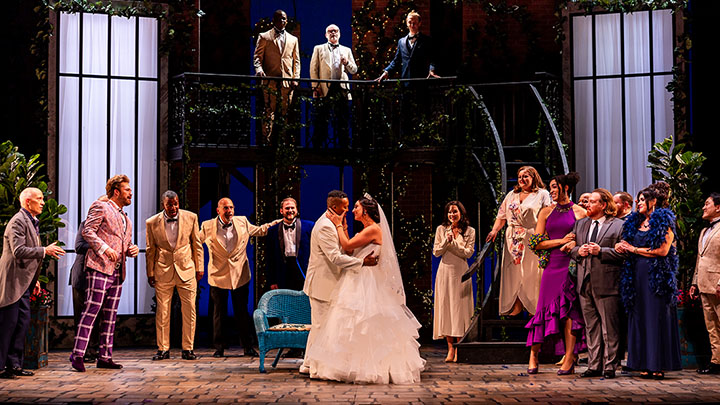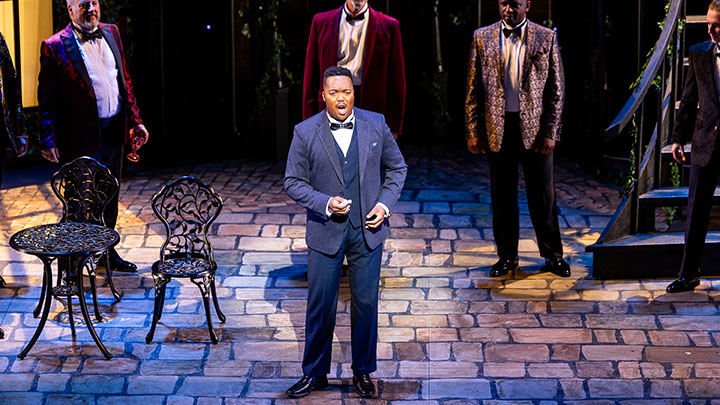Despite the charms of Rossini’s (with librettist Jacopo Ferretti) La Cenerentola – simple plot! cute characters! sparkling, funny music! – the piece challenges performers negotiating its gallant straddling of a more purely Mozartean idiom with the more programmatic, narratively oriented operatic concerns that would later distinguish the ottocento.
The less care taken to justify the particular traits and rhythms of bel canto opera – the long orchestral interludes, the da capo arias, the vocal flourishes that can easily seem superfluous – the more boring and bizarre the performance becomes. And in an opera like Cenerentola, where the characters are explicitly put forward as vague philosophical and fairytale ideas awaiting to be illuminated by song (the subtitle is “La bontà in trionfo,” after all), the balance that might ensure coherence is particularly tenuously struck.
Here in the second performance of Boston Lyric Opera’s short-lived run at the Emerson Cutler Majestic Theater, guidance came neither from the orchestra pit, where the usually dependable David Angus robbed the score of any sense of indulgence and play with a doggedly laconic reading, nor from Dawn M. Simmons’s production, which was purportedly set the opera in contemporary Boston with Don Magnifico a striver eager to break into the Boston brahmin set, but in reality didn’t feature more than a box of Dunkin Donuts munchkins to ground us in any particular place.
In her first operatic venture, Simmons seemed as limited by Jenna McFarland Lord’s vague, fussy, claustrophobic sets as she did by Rossini’s musical idiom; nearly every one of the opera’s numerous ensembles featured a center-stage lineup of the performers facing the audience dead-on as they trucked through patter and trills, building in volume but never in nuance. Physical comedy on an cast-wide scale, low-hanging fruit in a piece like Cenerentola, was scarcely anywhere to be found.
This makes what the rather unimposing tenor Levy Sekgapane as Prince Ramiro does even more remarkable. His tenor tenore altino timbre is limpid enough to the point of being effete and in a cast full of showboaters, he lacked a competitive flamboyant physical charisma, but his music-making is so natural and so pure he walked away with the evening. Beyond remarkable breath control, high notes stamped with easy precision, and pristine diction, his singing was so full of delightful little details that his each and every appearance brought a sense of relief. “Sì ritrovarla, io guiro” started with an arresting sweetness and restraint, featured lilting slides into the passaggio to rhapsodic effect and fully-supported high notes including a long-held C to crown the aria. This was, refreshingly (and uniquely in this cast), a singer without gimmicks – only talent, style, and the exceedingly rare sense of discretion to manage them both.
His Angelina, Cecelia Hall, is a star pupil of the Isabel Leonard school; she’s a glamorous looking brunette, acts with her eyes, and has a high-set mezzo with a pleasing graininess towards the center of her range. But in terms of authority with the music, there isn’t much to speak of – from high notes that tended shrill to low notes that tended pale, from a lack of definition in her coloratura singing to inconsequential handling of the text, her performance was disappointingly plain. “Nacqui all’affanno,” stuffed with unflattering ornaments as it was, coasted by on goodwill while Brandon Cedel’s grotesque and ceaseless mugging in the background as Don Magnifico rivaled her for attention at the end of a nearly 3-hour evening.
Indeed, while Cedel has an imposing instrument, clear and booming, which he intermittently put to effective use as Cenerentola’s buffoonish and cruel father, his preening was so over-the-top and his singing so accordingly indelicate that he could make Anna Magnani in Mamma Roma look repressed and Vittorio Grigolo at a curtain call downright agoraphobic. It was a performance that overstayed its welcome from the first aria, progressively losing substance during the course of the evening right up until he kept dragging the whole cast forward to take additional bows. There is surely a strong, maybe even stylish, basso buffo in there somewhere, but it’s going to need collaborators more forceful than Simmons and Angus to drag it out from beneath the antics.
Levi Hernandez, as Ramiro’s valet Dandini, boasts a dependably penetrating, handsome voice that was more than once challenged up against the role’s coloratura demands, but he’s an earnest presence and an effective comedian. James Demler, as Ramiro’s tutor (and Cenerentola’s de-facto fairy godfather), brought a desperately needed sense of graciousness to the lower voices. And here styled as influencers, the sisters Clorinda and Tisbe were the game Dana Lynne Varga and Alexis Peart. Peart, in particular, sang with a plummy snap that would have been welcome in Cenerentola’s Converse slippers (costumes designed by Trevor Bowen).
BLO will return in February with a performance of Joseph Bologne, Chevalier de Saint-Georges’s now-ubiquitous L’amant anonyme – I hope those star-crossed lovers can find their way to each other with a greater sense of balance.
Photos: Nile Scott Studios





